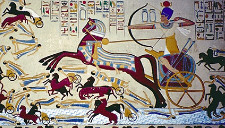An
Emancipation Proclamation
 |
| Do you know who this president is? He's James Buchanan |
President James Buchanan inspired no box office hits.
No luxury car companies are named after
him.
No works of fiction make him a
vampire slayer.
 |
| You have to know this one. |
Not so with the next president, Abraham Lincoln. His fame arguably surpasses every other
president in our nation’s past. Imagine
living 150 years ago in 1863 and witnessing his Emancipation Proclamation,
ending almost 300 years of slavery. The
Gettysburg address still sends chills down my spine, as distant as I am from
the situation. What an incredible moment
in our nation’s history!
The Bible tells of the great emancipation of a nation in
slavery for over 300 years. The book of
Exodus records one of the key events in Biblical history by chronicling the
nation of Israel’s deliverance from
Egypt (1:1-13:16), their descent to
Mount Sinai (13:17-18:27), and their dedication
to God by the covenant (19:1-40:38).
People have read this great book and drawn strength from it
for centuries. Strike that. Millennia.
It speaks volumes about the nation of Israel, about our own spiritual
battles, and about God’s great Messiah – the Lord Jesus Christ – as He is
foreshadowed in the many times God brings salvation. So as you read through Exodus, keep your eye
out for these features. Read the text:
a.) on a
historical level – what God did for Israel
b.) on a
personal level – how Israel exhibits your own spiritual weaknesses
c.) on a Christological
level – how “smaller” acts of salvation foreshadow the
greatest act of salvation
DELIVERANCE FROM EGYPT (1:1-13:16)
The Historical Level
 |
| Hyksos in battle |
But none of this should have been a
surprise. God had warned Abraham that
this would happen because He was being patient with the Amorites (see
Gen. 15:13-16) before judgment came. Did Israelites remember this promise? It
seems like some of them were.
Moses thinks God is preparing him to be
the long awaited deliverer (Acts 7:25). I
can imagine faithful Israelites “watching the clock” in anticipation of what
God would do. Can you think of the excitement
as the time drew near? Eventually the
time was fulfilled. Right on cue God intervenes.
The material in the first thirteen chapters
of Exodus should be familiar to any Sunday School attendee –
their oppression
as slaves (1)
the birth of Moses and his flight to Midian (2)
the burning bush
(3-4)
the command to make bricks without straw (5)
God’s promise of deliverance
(6)
Moses’ miracles of the snakes and the ten plagues (7-11)
the Passover
(12)
the exodus (13).
But familiarity breeds contempt. So be careful. These stories are so well known to many of us
and so there’s the temptation to think in a “felt-board world,” as if the
stories are made up fairy tales. But
these things actually happened to real people in real history! If it would have been exciting to witness the
Gettysburg address and see the long awaited freedom,
how much more exciting would the events of Exodus have been! As you read through Exodus, remember that
this stuff actually happened!
The Personal Level
 That’s not to say that there is no application for us
personally. We can easily identify with
Moses. How often do we have dreams for
doing something great, even something great for God, and it seems like nothing
happens? How often is there a "detour" in our perfect plan? Moses had to wait forty years in the desert! But God was doing a great work in him, making
him the meekest man on the earth (Num. 12:3).
That’s not to say that there is no application for us
personally. We can easily identify with
Moses. How often do we have dreams for
doing something great, even something great for God, and it seems like nothing
happens? How often is there a "detour" in our perfect plan? Moses had to wait forty years in the desert! But God was doing a great work in him, making
him the meekest man on the earth (Num. 12:3).
And we can easily sympathize with his reluctance to be used to God when the time does come. Who doesn’t read the story of the burning bush and think “Oh Moses, what are you thinking?! God’s on your side – you don’t have to be worried about your own inadequacies?” And then comes the Holy Spirit to us, like Nathan to David, saying “You are the man.” In Moses we learn it’s about God’s timing, not ours. And it’s about God’s ability, not ours.
The Christological
Level
 |
| Sculpture in U.S. House of Representatives |
In the next post, we'll consider seeing the next two sections (Israel's descent and dedication) at the historical, personal, and Christological level.
No comments:
Post a Comment